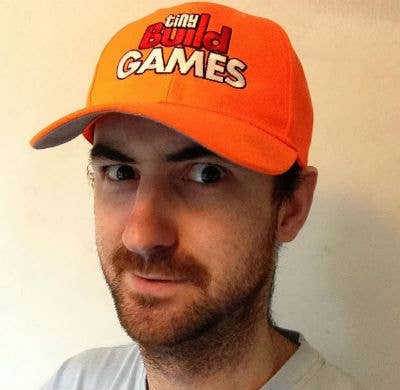The harsh reality of living the dream
For three Dutch indies, making a living from mobile development is becoming harder by the day - "This is when the bubble bursts"
In 1997, I was damn near certain I would become Britain's answer to Quentin Tarantino.
That dream, shared by so many in my generation, informed a distressingly large number of key life decisions over the subsequent years. It all came grinding to a halt in 2002, when I was finally mature enough to understand the number and nature of the obstacles I would have to overcome to even get a glimpse of Hollywood. Digital cameras and professional editing software were frighteningly expensive, distribution and exhibition channels were distressingly narrow, and the technological breakthroughs that would fundamentally alter so much of this were beyond my powers of imagination. The walls were simply too high, and I suspected that my creative talents would not be enough to scale them.
"It's very important to get featured still, but that's only because without it you make zero"
Nils Monshouwer, Weirdbeard Games
That crucial period of my life is very much on my mind as Casual Connect Europe draws to a close, and I watch the Indie Prize nominees pack up their games and head for wherever they call home. Just as the rise of YouTube, ubiquitous digital camera technology, and affordable editing software obliterated so many of the challenges facing filmmakers, the rise of smartphones and app stores were the catalyst for a new era of accessible, independent game development. In the absence of those old filters - the kind that deterred me from pursuing my own ambition - the number of people actively creating products in both industries has ballooned. Pretty much anyone can now have a go, and in mobile game development it often feels like pretty everybody is doing just that.
I am sitting with three Dutch game developers, all of whom represent games showcased in this year's Indie Prize, and all of whom have been trying to navigate the increasingly chaotic mobile market. Between them, their games have made it to 'best of the year' lists, received near universally positive reviews, and been featured on both the iOS and Google Play app stores.
"It's as much as you can do as a developer," says Matthijs Dierckx, who is at Casual Connect Europe with Sumico: The Numbers Game, his first foray into development after more than 15 years as a journalist and magazine publisher. "And the monetisation is just appallingly bad."

As a debutant developer, Dierckx has less experience with monetising games than the men sat to his right and left. Niels Monshouwer founded Weirdbeard Games back in 2007, a year before the iOS App Store even existed, and Iwo Wubbels is one of the pioneering figures in the Dutch indie development scene, co-founding Engine Software in 1995. But all of that accumulated knowledge amounts to little in a marketplaces containing hundreds of thousands of competing products, with thousands more added every single week. In that environment quality, polish, and the endorsement of Apple and Google are no longer significant factors in whether you can hope to even recoup your investment. It's a maelstrom, and it's only getting worse.
"Actually, if you don't get featured you don't make anything," says Monshouwer. "So it's very important to get featured still, but that's only because without it you make zero. Getting a good review from a website is almost completely useless. It doesn't work for the app stores or mobile games because the players don't read reviews. They see it as a snack. You don't read reviews for snacks. You read reviews for $60 games."
For Dierckx, making a game for that audience has been a distinctly lopsided relationship. Sumico was conceived and developed in his free time, and paid for by his day job as the founding publisher of Control magazine. That combination of passion and tireless hard work is exactly what makes the explosion of indie development so vital, and so appealing. It fits seamlessly with the engaged audiences like those found on Steam and the PlayStation Network, but the average mobile gamer is so casual about actually playing games that it borders on apathy. Sumico is free-to-play, with no aggressive monetisation strategies, and yet an attempt to generate revenue through video ads was met with a flurry of scornful one-star reviews.
"There's just no business model to be found in a system oscillating this much"
Matthijs Dierckx, co-creator of Sumico
"They were really kicking us," Dierckx says. "We have a paid, ad-free version of Sumico. Almost nobody buys that, and they hate the ads. The users just don't care if the developer makes money."
For the vast majority of indie developers working in mobile the use of advertising isn't evidence of a mercenary hunger for money. Rather, it is just another vital step in an ongoing attempt to build a sustainable business, a process that started when it became clear that mobile gamers weren't willing to pay upfront for the product. Indeed, premium prices have been out of favour for years already, and gathering a large enough audience for in-app purchases to be effective requires either a marketing budget or - as is often the case with mobile's diminishing handful of breakout hits - a healthy measure of good luck.
The rise of ad networks promised a third option, one specifically tailored to the needs of smaller developers with no resources for buying installs. There was no expectation that using ads would lead to untold riches, and at any rate, mobile indies are now more focused on a much more humble goal: survival. "We have to be able to make a sustainable living," Monshouwer says. "Some people want to be millionaires, but there are more who just want to make a living."
Just as the influence of being featured on the App Store or Google Play has been eroded by the crush of new developers and new games, the ad networks are also struggling to deliver any extra stability. Developers like Dierckx and Monshouwer are working as hard as ever to reach the quality levels required to catch Apple's notice, and to build a big enough audience to monetise, but there is growing disconnect between resources invested and profit returned. Wubbels mentions a mobile game his company developed in collaboration with a Dutch stand-up comedian. It was downloaded more than 300,000 times over the space of two days in Holland alone. In total, the game's advertising earned "a few hundred Euros" in revenue.

"Everybody is saying that free-to-play works," Wubbels says. "But if this is the ratio then how many million [downloads] do we need to have?"
Dierckx is facing similar difficulties with Sumico. "If I'm being very honest, I sort of bought into the [ad networks'] pitch. The fact that none of the networks ever actually show numbers should trigger an alarm bell, but we didn't have bizarre expectations. We have 400,000 downloads on Android, with a retention rate of almost ten - so every install, on average, is played ten times. But if you look at our income it's a couple of thousand Euros. These numbers just don't add up."
This is exacerbated by a lack of stability in the revenue that ad networks actually do generate for the developer. During its most lucrative period, Sumico was earning $150 a day from video ads, but that collapsed to just over $10 almost overnight. "According to our ad provider, one - just one! - advertiser stopped a campaign and our revenue plummeted by 90 percent the next day. Literally, 90 percent," Dierckx says. "There's just no business model to be found in a system oscillating this much."
And yet that's just what the ad networks claim to provide, though Monshouwer suspects that most of them are "spread too thin" to really deliver on that promise. As in the app stores, there are simply too many developers, too many games and, crucially, too little engagement within the audience for advertising to be a solid revenue stream without significantly more than 400,000 downloads. This is all the more troubling for the fact that the vast majority of games released on the app stores don't even come close to that figure - indeed, research cited in this article from Gamasutra indicates that 80 per cent of apps on the App Store receive no downloads at all.
"I'm super straight up when I talk to a mobile developer, and this is what I say: It's a minefield"
Mike Rose, Tinybuild
"If you look at the App Store it's like the 1 per cent and the 99 per cent," says Monshouwer, but don't leap to any conclusions about where he sees himself in the overall picture. The very fact that Sumico and 99 Bricks have been downloaded hundreds of thousands of times each, received strong reviews and been featured on the app stores puts them far away from the 99 per cent. It's just that, in the current mobile market, being a part of the privileged few doesn't mean that you're actually making any money
"Real success is still possible, but it's a roll of the dice," Dierckx says. "Being featured is already in the one per cent - or even less."
"One tenth of a per cent," Wubbels adds.
The same metaphor is used by Mike Rose, a former Gamasutra journalist who is now a talent scout for the publisher and developer, Tinybuild. Rose spends his days meeting with a stream of indie developers and offering advice on how to get their games ready for market. Every now and then Rose finds a game that he believes will be a good fit for Tinybuild's publishing services, but for the most part he's simply helping the growing indie community to navigate an increasingly treacherous landscape.
"There's hundreds of new games every single day, and you don't hear about 99 per cent of them because they're just crap," he says. "I would say it's not hard to be in the top 1 per cent of the games coming out on mobile. You just need to put a little bit of effort in and you can be in that top 1 per cent.
"Think about it like this: How many successful mobile games can you think of that came out last year? You can probably do it on two hands. You know them. And it sounds really impressive when Monument Valley sells 1.5 million... Actually, I think they've sold 2.2. million units now, and that's super impressive - but it's an anomaly.
"It's misleading. No developer should be looking at Monument Valley and aiming for that. I mean, how much did they spend? Ustwo is a big company that's been around for ages. They know what they're doing. I'm super straight up when I talk to a mobile developer, and this is what I say: It's a minefield."
Keep in mind that this statement comes from the representative of a company that released its first mobile game in December last year: Spoiler Alert, developed by Megafuzz, which Tinybuild has elected to sell for the handsome sum of $0.99. At this point in time, that qualifies as a ballsy move, but Rose believes that, as thankless as the mobile market can be for the small teams that create almost all of its products, there are still ways to impose order on the chaos.

In his previous life as a journalist, and in his current one as a talent scout, Rose makes a point of speaking at conferences on the subjects that are most helpful to indie developers. For the last couple of years, every single one has been about marketing. If you're working in mobile with limited resources - as so many are - a marketing plan is now as important as the design document, and perhaps more so. It should be in place, Rose says, before the first day of development.
"The problem is that so many devs are so good at making games, but then most of them are terrible at talking about it. That's fine. You don't have to be good at that. But then a lot of the time they won't do anything about the problem.
"The marketing side of this stuff is getting really bad now. It was bad a couple of years ago, but now it's really bad."
For developers like Dierckx, Monshouwer and Wubbels this only contributes to the sense of a market that is no longer compatible with the sort of developers everyone hoped it would empower. You can make a great game, publish on every every available platform, with a guerrilla marketing plan in place from the very beginning, and receive multiple features on the app stores, but without the ability to buy new users you still have to rely on, as Dierckx puts it, "so, so many factors that are beyond your control."
Of course, it can be argued that no platform in the history of gaming has been free of such risks, with the really big bucks generally reserved for those with enough money to buy the public's attention. There is certainly truth to that perspective, but it is far less nuanced than the subject it attempts to address. We're not dealing with people complaining because they can't be Supercell, only that there is no longer a stable way to even make a living. When Monshouwer considers the long list of actions an indie developer must take to improve the chance of just breaking even, it's necessary to weigh the effort against the return and make a judgment on whether mobile is worth pursuing any longer.
"What we have now on mobile, that's where we're going on Steam. Because Steam is the easy next step for everybody"
Iwo Wubbels, Engine Software
"You hear it a lot here at Casual Connect. A lot of people are saying it," he says. "The entire situation on the app stores right now is nuts, and it can't be sustained much longer. Even the big guys - the Kings and so on - they have to pay so much per install now that, for them, it's just a balancing act. They put in millions and get out millions, but, yeah, that's ending."
"There's too many developers," Wubbels adds. "In my opinion, the entire ecosystem will change in the next few years. I don't know where it's going, but what it is now will be gone. It's too late to make it sustainable, so it will crash. Whether it's one, two or five years, there will be something new."
All three developers point to the total dominance of the App Store and Google Play in Europe and North America as a major part of the problem, particularly as neither company appears willing to address the chronic overcrowding and harsh business conditions developers are facing. They talk about the possibility of a Netflix-esque subscription service providing some competition, or the huge popularity of Asian mobile messaging companies like Line and Kakao. They even debate the value of returning to the publisher model we were only too eager to be rid of less than a decade ago - anything to reverse the trends that are pushing the mobile market further and further away from being a healthy ecosystem for independent developers.
"I will definitely gear the next [game] around the PC or Mac," Dierckx says. "When you look at developers who have been successful in the last couple of years - and we're talking smaller, 5 to 25 headcount companies - at least in the Netherlands everyone who's actually earning decent money is making PC or console games. But definitely not a mobile game. And that's a shame, because it's such a nice gaming device. Everything about it feels right. Games play brilliantly on mobile. It makes so much sense to develop for it. Until you start looking at the numbers.
"It is a bit grim currently, to be very honest, especially considering the amount of studios that still depend on the app stores. They don't have alternatives or other strategies. So over the coming months and years, until the next big thing, a lot of studios will just cease to exist. This is when the bubble bursts."

